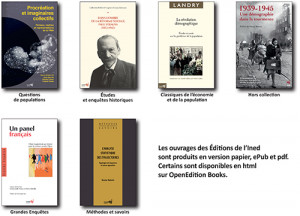Éva Lelièvre and Wanda Romanowski
Éva Lelièvre, senior researcher and co-director of the INED Publications editorial review committee, and Wanda Romanowski, head of INED Publications, explain INED digitization policy.
(Interview conducted in November 2021)
What is INED Publications digitization policy and what does it aim to do?

INED began publishing books as soon as it was founded in 1945. Diffusing and promoting this unique back catalog of 400 titles is fundamental, and an official Institute mission. One means of achieving that goal is digitization, which not only makes publications accessible in a non-paper format but also ensures their diffusion to a wider public. Digital and print formats are complementary and have different uses: internet users can easily search within publications, while material books allow for more in-depth reading.
Are all INED Publications books destined for digitization?
No, not all books need to be available in digital format. Conversely, some—certain manuals, for example—may be published solely in that format.
Since 2017, the Editions de l’INED have diffused each new release in three formats—paper, ePUB format, and PDF—and from 2020, in html format.
The reading committee determined which books should be digitized and diffused first. We identified three categories: recently published books; older important books, many of which are out of print; and major works for which prefaces are to be commissioned that will present the context in which they were published and either point out, accordingly, their timelessness, their resonance with current issues, or their particular contribution to population sciences, or signal how the discipline or way of viewing society has changed since the book was written. The last category of books—updated editions— will be released in paper as well.
Thirty back catalog titles have been digitized in the last two years thanks to OpenEdition’s digitization support program. Funds still need to be found for digitizing an additional one hundred works.
What has digitization involved? And what platforms carry INED books?
Producing digitized versions, particularly in ePUB and html formats, required changing our production practices and work organization by way of the Métopes [Methods and tools for structured publishing] chain, a system we have been using for several years now. To get a digital version of new releases, we had to set up a specific process that produces them at the same time as the printed paper version. And for OpenEdition works, a reading and correcting system had to be developed as the OCR process did not always work with the original version.
Demography is a quantitative social science, meaning that our publications, are full of equations, tables, graphs, and figures and can therefore be complicated to digitize.
Digital and printed versions of INED works are sold by bookstores through our distributor, FMSH Diffusion. In addition, six series have been opened on OpenEdition, representing nearly fifty books, to which we will be adding all new releases as they are produced. The html format of books diffused on our platform can be consulted in full and free of charge.
Last, INED Publications now offers authors a digital solution for diffusing data used in their publications. An INED Publications collection was started this year on the Nakala data warehouse (TGIR HumaNum) to house the content of CD-Roms that used to be inserted into printed books, as well as tutorials and related files of all sorts: archives, photographs, datasets, and more.
